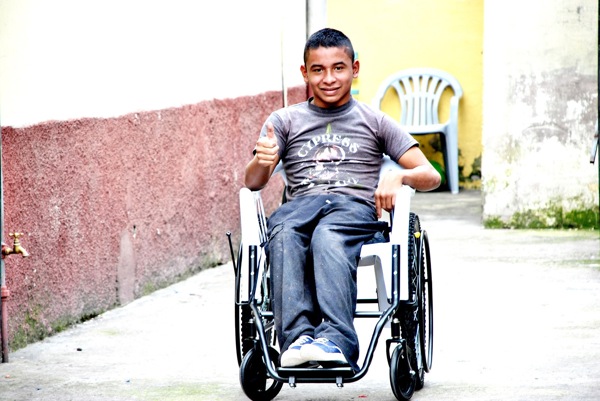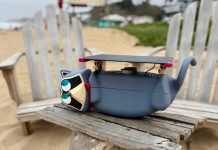
“What would it be like to crawl for the rest of your life?”
That’s the question Don Schoendorfer asks when talking about the charity he founded, Free Wheelchair Mission, a non-profit organization dedicated to giving the gift of mobility in the form of simple, sturdy and rugged wheelchairs to those in need in developing countries around the world.
A wheelchair can totally transform a person’s life, Schoendorfer said.
“The outcome is so visible,“ he said. “You can see somebody’s life totally change in a matter seconds.”
The total cost to literally pick someone up from out of the dirt and give them the gift of mobility? Just $63.94.
“Every $63.94 gets turned into a wheelchair,” that someone desperately needs, he said.
And that need is great all around the world.
There are an estimated 100 million people in developing countries that need wheelchairs but cannot afford to buy them.
Currently, there are 648,495 wheelchairs in production and shipped in 86 countries. Schoendorfer’s goal is for the organization to distribute at least 20 million wheelchairs.
“That’s 20 percent of what the world needs,” he said, but they need help to reach everybody.
Schoendorfer emphasized the importance of spreading the word about the Free Wheelchair Mission and raising awareness.
“Out of the communication, funding will come,” he said. “There is a huge problem and we have simple solution.”
The growth of the organization has stayed with the rate of the economy, Schoendorfer said. People donate with the discretionary funds that they have available, he explained, so funding has leveled off in the last three years, but there still has been a little growth, he added. The organization has also found ways to save money, he said.
One of the bigger fundraisers for the group is the annual Magic of Mobility event, which will be held this Tuesday at the Hilton Orange County in Costa Mesa.
The organization may be based out of Irvine, but there are many Newport Beach supporters and sponsors, including Nordstrom’s at Fashion Island for the event on Tuesday.
Many local businesses also donate to the night’s silent auction event, said Andrew Young, the organization’s communications specialist.
Other Newport Beach supporters include Roger’s Gardens, Young said, as well as many local churches, private schools and private donors.
There are many ways individuals or groups can help and make a difference around the world, the organization’s website, www.freewheelchairmission.org, states.
“Already suffering with the pain, inconvenience, exclusion and indignity of a physical disability, many of these people with physical disabilities must endure further burdens,” the FWM website states.
Many have to crawl or be carried to go anywhere, according to the website.
“They are subjected to danger and disease. Many succumb to hopelessness. Safety nets are few, and available social services are scarce,” the site states. “Families strain to care for their disabled loved one within an already overburdened existence.”
Schoendorfer aims to lighten that burden through the Free Wheelchair Mission.
The organization was founded in 2001, about two decades after Schoendorfer and his wife, Laurie, were vacationing in Morocco and saw a disabled woman struggling to drag herself across a dirt road.
“Ignored by the crowds and barely evading traffic, the woman’s hardship was a scene the couple would be unable to forget upon their return to life in southern California,” the FWM website states.
Years later, the image still haunted him and he felt compelled to do something.
“The most compelling reason, the most driving part of it [starting the FWM], was when I discovered on the internet the need for wheelchairs was so great and so poorly defined,” Schoendorfer said.
After some research, Schoendorfer discovered that the current count estimated that there were between 20 and 130 million people worldwide that needed wheelchairs.
“That was compelling because why should that be such a range?” he said.
The organizations at the time, try as they might, had barely scratched the surface with approximately 100,000 wheelchairs donated.
“It was admirable that the other organizations did that, but that’s only one percent,” he said. “That’s not particularly satisfying to the other 99 percent.”
The problem was the cost of shipping new or refurbished American wheelchairs, as well as not being appropriate for the terrain in the countries they were being used in and parts becoming harder to get for the older chairs.
So, being an engineer, he looked at the problem from a logistical angle.
He researched ways to make the entire process more functional, Schoendorfer said. He asked himself, ‘What parts are already being manufactured, what can easily be repaired in developing countries, and what is the most common and comfortable chair?’
The answer? Bicycle wheels and white resin chairs.
“It may not have all the features that a modern chair has, but it’s simple and durable,” he said, and can handle more rugged terrain, easily repaired and inexpensive.
The testing overwhelming successful, Schoendorfer said. And it wasn’t very hard to find willing partner groups to distribute them, he added, he quickly found several Christian and humanitarian organizations wanting to pass out the wheelchairs.
“Things just fell into place. Sometimes when things are simple you know you are on the right path,” Schoendorfer said. “I surrendered (to the fact that) God was in control and I am an obedient servant.”
And the Free Wheelchair Mission was born.
The group’s mission became “to provide the transforming gift of mobility to the physically disabled poor in developing countries, as motivated by Jesus Christ.”
The group is a faith-based organization, Schoendorfer said, but the chairs are distributed free to those in need, regardless of one’s religious affiliation, if any. The group has a “non-discriminatory, open door policy,” according to the website.
They want to help anyone who needs it.
The areas that receive the wheelchairs are the poorest of the poor, Schoendorfer said, so when a family member is born disabled or somehow becomes disabled it becomes even harder for the family to survive.
“Imagine what it would be like if you couldn’t walk and you didn’t have a wheelchair,” Schoendorfer said. “What would it be like to crawl for the rest of your life?”
For details about the event or more information about the charity, visit www.freewheelchairmission.org.




